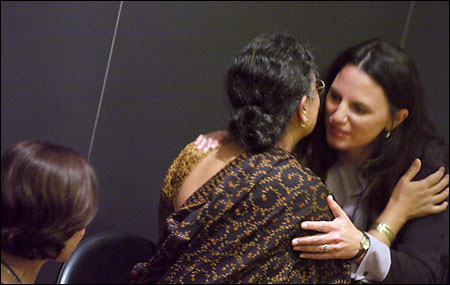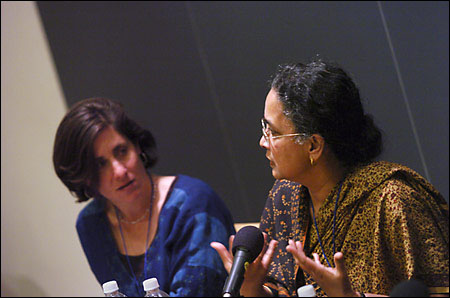‘Acting on Faith’ explores lives of three women
Film premiere introduces pioneers of new women’s movement

A standing-room-only crowd packed Fong Auditorium in Boylston Hall on Tuesday (April 26) for the premiere of “Acting on Faith: Women and New Religious Activism in America,” a documentary film produced by Rachel Antell M.T.S. ’92, a Pluralism Project research affiliate. Diana L. Eck, director of the Pluralism Project and professor of comparative religion and Indian studies, narrates the film. The event, which included a screening, a panel discussion, and a reception, was hosted by the Pluralism Project, a research organization at Harvard dedicated to helping Americans engage with religious diversity.
“Acting on Faith” offers an intimate look into the lives and work of three American women activists for whom faith is a catalyst. The film shows these women at work, with their families, and at play as they reflect on the compatibility of feminism and religion and the tension of being a critical voice without alienating one’s community or inviting outside prejudice. Their strategies are simple yet surprising: Laila Al-Marayati illustrates how the Muslim principle of zakat (purifying through the act of giving) served as the inspiration for the first free clinic in South Central Los Angeles; Shamita Das Dasgupta uses strong female figures in Hindu myth to provide encouragement to battered women to leave abusive husbands; and Mushim Ikeda-Nash integrates the uniquely relational experiences of women into the American Buddhist practice. Through their stories, the film offers insight into, and encourages dialogue on, the thought and action of women activists from different religious and cultural traditions in the United States.

Following the screening, Eck moderated a panel discussion with the women featured in the film and its producer. Dasgupta explored the ways in which the events of September 11, 2001, continue to effect the South Asian community in general, and South Asian women survivors of domestic violence and trafficking in particular. She suggested that calling upon local law enforcement is often not an option for immigrant women who fear detention or deportation.
Al-Marayati echoed some of these concerns. She described how her hope for a brighter future rests in each woman she is able to help in the clinic where she works. This smaller picture, she suggested, “is really the larger picture.”
Asked how women activists of faith might respond to the intense demands of their work, Ikeda-Nash suggested that women activists “take a vow not to burn out.” She described her own sense of accountability to herself, her family, and her community, which includes a commitment to live longer under less stress and to bring spiritual practices to activism through spiritual contemplation.
At a reception in Ticknor Lounge, audience members had a chance to mingle with panelists and to network with their colleagues. Producer Antell remarked that she was “pleased with how much interest the film generated, and very excited by some of the ideas people had for future use of the film in their work.” Since the premiere has been advertised, the Pluralism Project has been fielding dozens of requests from all over the country for future screenings in community, religious, and educational centers. The project is working to develop a resource guide to accompany the film, as well as a strategy for distribution.
For information on how to obtain a copy of the film, please visit http://www.pluralism.org or contact: Kathryn@pluralism.org.




